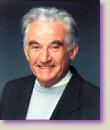- |
User Links
All the Earth, Proclaim the LORD
Serve you the Lord
Versifier: Lucien Deiss (1965)Tune: [Serve you the Lord, heart filled with gladness]
Published in 14 hymnals
Audio files: MIDI
Versifier: Lucien Deiss
 Born: 1921, Paris, France.
Died: October 9, 2007, Île-de-France, France.
Buried: Seminaire des Missions, Chevilly-Larue, Île-de-France, France.
A member of the Holy Spirit Fathers, Deiss attended the Gregorian University in Rome and taught theology at the Grand Scholasticat of Cheville in Paris, France. His works include:
Early Sources of the Liturgy, 1967
It’s the Lord’s Supper/, 1976
Spring Time of the Liturgy, 1979
Sources:
Brink & Polman, P. 313
--www.hymntime.com/tch/… Go to person page >
Born: 1921, Paris, France.
Died: October 9, 2007, Île-de-France, France.
Buried: Seminaire des Missions, Chevilly-Larue, Île-de-France, France.
A member of the Holy Spirit Fathers, Deiss attended the Gregorian University in Rome and taught theology at the Grand Scholasticat of Cheville in Paris, France. His works include:
Early Sources of the Liturgy, 1967
It’s the Lord’s Supper/, 1976
Spring Time of the Liturgy, 1979
Sources:
Brink & Polman, P. 313
--www.hymntime.com/tch/… Go to person page >Text Information
| First Line: | Serve you the Lord |
| Title: | All the Earth, Proclaim the LORD |
| Versifier: | Lucien Deiss (1965) |
| Meter: | 4.5.6.4 with refrain |
| Language: | English |
| Refrain First Line: | All the earth, proclaim the Lord |
| Copyright: | © 1965, World Library Publications, Inc. |
English
- Australian Hymn Book #100
- Breaking Bread (Vol. 39) #423
- Glory and Praise (3rd. ed.) #695
- Journeysongs (3rd ed.) #620
- One in Faith #828
- Oramos Cantando = We Pray In Song #519
- Praise y Adoración: a bilingual hymnal : un himnario bilingüe #46a
- Psalter Hymnal (Gray) #176
- Songs for Life #21
- Together in Song: Australian hymn book II #60 10 shown out of 11
Spanish
Notes
Scripture References:
ref. = Ps. 100: 1
st. 1 = Ps. 100:2
st. 2 = Ps. 100:3
st. 3 = Ps. 100:3
st. 4 = Ps. 100:4
st. 5 = Ps. 100:5
This lively setting of Psalm 100 was composed by Lucien A. Deiss (b. Paris, France, 1921), a missionary, biblical scholar, liturgical expert, hymn writer, and composer who is recognized worldwide for his leadership in biblical studies and the renewal of worship. He was in the forefront of the movement in the Roman Catholic Church to sing congregation ally in the vernacular. "All the Earth" is one of Deiss's most effective settings and has gained popularity far beyond its original Roman Catholic context. It was first published in French in Sur la lyre a dix cordes (1952); the English version was published in volume 1 of Biblical Hymns and Psalms. The refrain comes from Psalm 100: 1, stanzas 1 through 5 cover the rest of the psalm, and stanza 6 is the customary trinitarian doxolo¬gy (see PHH 246 for a brief explanation of trinitarian structure). See PHH 100 for textual commentary on Psalm 100.
Educated at the Gregorian University in Rome and a member of the Holy Spirit Fathers, Deiss taught theology at the Grand Scholasticat of Cheville, Paris, and was influential in the liturgical reform of the Second Vatican Council and of the Roman Catholic Church. A frequent lecturer and workshop leader, Deiss specialized in worship, church music, and liturgical dance. He regularly appeared on Vatican radio and on French television. His works are widely published (and translated), including Early Sources of the Liturgy (1967), It's the Lord's Supper (1976), and Spring Time of the Liturgy (1979). Under his supervision, his best-known worship songs were translated in Biblical Hymns and Psalms (2 vols. 1965, 1970; revised 1973), A Child Is Born (1974), and Sing for the Lord (1977); these and others hymns were also issued on at least twenty recordings. He and Gloria Weyman have collaborated on work in liturgical dance.
Liturgical Use:
Suitable as a processional psalm (see also 100); Thanksgiving, Epiphany and missions services. See also PHH 100.
--Psalter Hymnal Handbook
Tune
[Serve you the Lord, heart filled with gladness]The name DEISS 100 was assigned by the editor of the Psalter Hymnal. Like virtually all of Deiss's music, this tune is intended for responsorial singing involving a cantor on the stanzas and everyone on the refrain. The whole song should be sung without pauses between the refrain and the stanzas. Be…


 My Starred Hymns
My Starred Hymns


